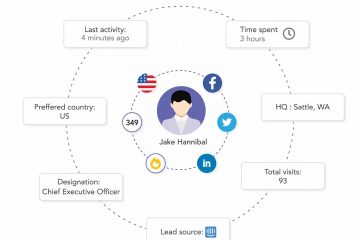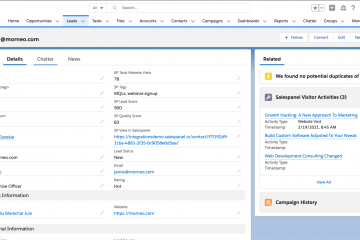How the Metaverse Will Change Digital Marketing
“Today I think we look at the internet, but I think in the future you’re going to be in the experiences.”—Mark Zuckerberg
It’s expected that revenues from the Global VR industry will reach over $6.71 billion by 2022, and an even more impressive $12.19 billion by 2024. It was also estimated that approximately 85 million users’ experiences AR or VR at least once a month in 2021.
Marketing specialists and businesses alike have waited for years to see the AR/VR industries taking flight. Now that they have, they pose unique brand promotion and advertising opportunities for brands across a wide range of industries.
As we continue to adapt to new ways of marketing to customers through the use of augmented, virtual and mixed realities, the marketing game will shift dramatically. Brands that wish to prove successful in their efforts need to keep their consumers central in their messages. At the same time, they need to use pioneering technologies to help them connect with leads in ways that were never possible before now.
Marketing in the Metaverse
The ‘Metaverse’ is one of the biggest buzzwords around in 2022, and for good reason. Facebook CEO Mark Zuckerberg made waves when he introduced his new company, Meta. The new brand is specially designed to bring together people and modern technology in exciting new ways.
The term ‘metaverse’ was originally penned by American science fiction author Neal Stephenson in his 1992 novel, ‘Snow Crash.’ Today’s Metaverse from Meta differs from his concepts significantly. The original metaverses are a form of blockchain for marketing specialists that require no administrators or services due to their decentralized nature.
Marketers who use the new metaverses in the future will be able to reach out to their customers in ground-breaking, albeit centralized ways. Completely reshaping the digital marketing landscape in the process. Facebook, for example, is centralized in nature, and won’t likely become completely decentralized. It’s important to note that the Meta Metaverse and other metaverses don’t have to be decentralized to serve as valuable marketing tools.
The Meta Metaverse has been engineered to help people connect with each other, find like-minded communities, and grow digital businesses with ease. It involves a shared virtual space in which digital avatars represent users. The worlds in the Metaverse continue to expand and evolve based on users’ actions and interactions therein. This means that the Metaverse has no true ‘end’. It carries on growing as more users join it.
Marketing agencies and their employees need to bear in mind that Meta’s Metaverse and other virtual environments are digital locations. In these locations, consumers can gain information, make purchase decisions, and spend money. Businesses who wish to capitalize on this technology need to build relevant, engaging and long-term positions within the Metaverse. If they do this, they’ll reach their target audiences effectively.
Your marketing strategy should include experts who can determine the best ways possible to incorporate new technology into businesses’ existing advertising approaches. They can then use immersive technologies to carve new ways forward into the future of digital commerce.
Key Aspects of the Metaverse
The Metaverse boasts a number of unique and innovative features that make it a boon to marketers. Its defining characteristics include:
- The Metaverse is always active and does not pause when a user leaves it. The virtual realities within it continue on indefinitely, regardless of whether or not users are present.
- It exists and operates in real-time using a timeline similar to that of real-world time. This makes it easy for marketers to reach target audiences at the right times using B2B SaaS software.
- Users have free individual agency to conduct different activities at the same time.
- The Metaverse is a fully functional, self-contained universe that enables users to buy, sell, create, invest, learn, play and own. Users can also gain recognition and acclaim for the work they put into expanding the Metaverse.
- It contains a range of different platforms that can work together or independently of each other. This allows users to bring items from one video game into another, for instance. Or to share brand messages across multiple digital environments.
- It allows for user-generated content. Metaverse users can create and share content that others users can appreciate too. This is a similar concept to user-generated content in social media marketing, which has proven to be a great way of raising brand awareness in digital settings.
Driving the Future of VR Brand Promotion
Metaverse marketing is the next step in the world of digital marketing.
Think of it as a transition similar to our steps away from news, radio and television advertising towards social media, SEO and inbound marketing methods. Currently, businesses that advertise online using search engines and social platforms use text, graphics and videos to get their core messages across. As VR technology becomes more commonplace, these visuals will become virtual and 3-dimensional in nature. This will present new challenges for marketers in the field.
The rise of the Metaverse may herald major changes in search engine optimization too. It’s difficult to predict how SEO will change. But some experts expect that Google will take a more immersive stance, offering a mixed reality search engine that allows consumers to visit websites using VR technology. Brands will need to adapt by reworking their storylines in 3D media. Marketers will have to stay abreast of rapidly developing technological trends to keep their approaches relevant.
According to Cathy Hackl, a renowned Metaverse, web 3.0 strategist and tech futurist, everyone is capable of becoming a ‘world builder’ in the Metaverse, including businesses and brands.
What will happen to social media marketing in the age of the Metaverse?
The social media systems of the future may resemble Fortnite and Roblox. It will allow users to create 3D, augmented reality avatars that they can use to browse websites and make purchases. The options available to marketers are endless. And it’s certain that VR will impact the Metaverse customer journey from start to finish.
When it comes to content marketing, only around 3% of the content on the web today can currently get classed as interactive. Most of the content on the internet is passive, including videos, images, and more.
Videos and Gifs are already prominence and the Metaverse could change this by facilitating the creation and sharing of interactive graphics that respond according to users’ actions. Interactive media encourages exploration and discovery. Brands can use this to their benefit by allowing users to learn more about their products, services, and missions in fun and engaging ways.
Brand experiences that resemble real-world situations or reflect what a brand does in real life will help brands create lasting connections with their customers and leads.
Marketing Challenges in the Metaverse
Marketers and users alike could face a few unique challenges when using the Metaverse.
First, because of the technological requirements of metaverses, accessibility is potentially limited for many audiences. Not everyone has access to the devices necessary to access the Metaverse, nor the budget to buy VR lenses and top-tier PCs. This may prove to be a hindrance for mass marketing efforts.
Brands also need to take care to seamlessly integrate their marketing efforts to avoid alienating users from their brands. Many brands may have trouble finding their niche in the Metaverse, and could come off as overly tenacious in their messaging. Planning your placements properly is critical to ensuring that your messages seem natural and well-integrated in the right environments.
Security and data privacy are two more important issues to consider.
New technologies always bring with them a need for updated digital security measures, including new measures for data privacy and protection. Personal verification in the Metaverse may require more data from users, thereby elevating data privacy risks. Brands need to take care to adhere to data privacy best practices in order to build trust with their target audiences.
Last, the free and open nature of the Metaverse means that brands need to take caution when protecting their images. The more control users have on digital platforms, the more likely it is that your brand could appear beside offensive or questionable media. Or have its placements disrespected or ripped off by certain users.
The key to avoiding this is to be mindful, deliberate, and seamless with your marketing strategies. In doing so, users will be comfortable sharing the virtual space with your brand and engaging with it as well.
The Takeaway
Many companies are investing in metaverses today. They are banking on their success, not just as entertainment platforms, but for professional and business purposes too.
The highly anticipated Meta Metaverse is still a relatively new and novel concept, especially for marketers and brands. However, a wide range of businesses stand to benefit from this technology, which allows for creative advertising methods and endless experimentation.
The Metaverse and other metaverses to follow will provide environments in which users can learn, build, explore, share, and, of course, make purchases. Brands that can effectively create new realities that they can share with their target audiences will usher in a new era of marketing.
Sell more, understand your customers’ journey for free!
Sales and Marketing teams spend millions of dollars to bring visitors to your website. But do you track your customer’s journey? Do you know who buys and why?
Around 8% of your website traffic will sign up on your lead forms. What happens to the other 92% of your traffic? Can you identify your visiting accounts? Can you engage and retarget your qualified visitors even if they are not identified?






